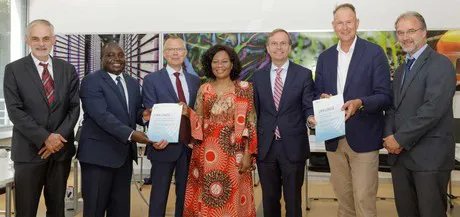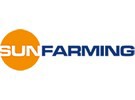With SUNfarming Food & Energy Greenhouses in parallel producing solar energy and producing food safety on the same land area is the aim of a German-African research project involving SUNfarming and Forschungszentrum Jülich, which funds the Federal Ministry of Education and Research (BMBF) with around two million euros.
"Africa is a key partner in the fight against climate change, with the aim of enabling Africa to deal with the consequences of climate change, but it is also about a new partnership for sustainable energy supply." In the project YESPV-NIGBEN, German know-how is being developed helping to improve the food supply in West Africa, we are using research and innovation to support sustainable business models and perspectives for the people in their home countries of Nigeria and Benin," said Research Minister Thomas Rachel.

When handing over the funding certificates: (from left) Prof. Uwe Rau, Director of the Institute of Photovoltaics, Dr. med. Solomon Agbo, Corporate Development, Board Member Prof. Harald Bolt, Mobolaji Sakirat Ogundero, Deputy Nigerian Ambassador to Berlin, Secretary of State Thomas Rachel MdB, Peter Schrum, SUNfarming, and Prof. Ulrich Schurr, Director of the Institute of Plant Sciences. Credit: Forschungszentrum Jülich / Ralf-Uwe Limbach
With the three-year project YESPV-NIGBEN ("Earnings analysis and socio-economic impact assessment of photovoltaic-assisted food production and drying in the tropical climate of Nigeria-Benin"), researchers from Nigeria, Benin and Germany are contributing to solving this problem. To reduce land-use conflicts between agriculture and energy production, combined "photovoltaic greenhouses" are developed for the cultivation of fruits and vegetables. The photovoltaic system adapted to local conditions allows power to be generated for the greenhouse and the local utility grid. Greenhouses are the basis for a predictable, continuous production of food. At the same time, drying systems are operated with solar energy, and ventilation and management systems are developed. The goal: to make local crops more effective than before. Thus, surpluses can be processed in large quantities.
"We were in Nigeria and Abuja in August at the Kick Off Meeting“, explains Holger Schönherr, SUNfarming project partner. "Every fifth inhabitant of Africa is starving. Heavy rainfall periods alternate with extreme drought. In Nigeria and Benin enough food can be produced, but the distribution and preservation represent two of the major problems. Thus 60% of the crops rot at harvest time. At SUNfarming, we are convinced that we can contribute to food safety through sustainable energy and drying processes with Food & Energy plants," Holger Schönherr continues.
For more information: Sunfarming
Sunfarming
+49 3362 / 88 59 120
[email protected]
sunfarming.de
